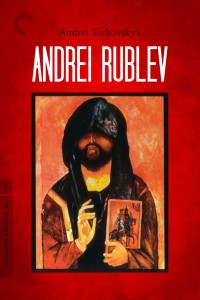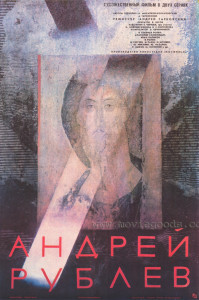“You know how much I envied? Envy just gnawed at me. It was inside me like a poison.” In 1966, Andrei Tarkovsky wrote, along with Andrei Konchalovsky, and directed his epic period piece Andrei Rublev. It is a two hundred and five-minute look into medieval Russia. Although the central character of the film is icon painter Andrei Rublev, it is more focused on life in Russia when Christianity was central to the country and the effects that artistic creators had on society. The film is paced into nine chapters taking place between 1400–1424.
It is difficult for me to really dig into what Andrei Rublev means to film; it passes the test of excellent story and delightful cinematography. However – and I know I have mentioned this before – I don’t think that I have the correct context to corroborate a placement on this list. Again, it is a wonderful film and I know that Tarkovsky is a wildly important director in the history of cinema.
What I do know is that the film was not initially welcomed in the Soviet Union when it was completed, since the heart of the picture is a Christian nation. It was released in a communist country with state atheism trying to wring out the faith-based history and revolutions. I don’t typically watch many faith-based films as they typically frustrate me; whether there are liberties or fanaticism, they seem to twist the stories to match a single objective. This is not something that I experienced with Andrei Rublev.
As I have mentioned, Tarkovsky was more interested in creating medieval Russia than he was in crafting a biopic of Rublev. To this end it seems that he was able to capture my understanding of Christianity during the time period. On one side, he did not shy away from showing the persecution by the hands of the Christians against the pagans during their festival of love. It is impossible to argue that these attacks did not happen and it is ignorant to turn a blind eye on what strife state religion has caused on people who believed differently.
On the other side, Tarkovsky highlights the faith of the monks and how they applied their God-given gifts in life, and questioning their beliefs during times of internal strife, be it the envy that Kirill suffered or Rublev witnessing the brutal attack of the Tartars that forced the painter to kill someone. Watching Rublev deal with his sin by denying himself the relief his art granted affords him an opportunity to see the effects of an organization on an artist when he comforts the bell maker. There is a tenderness and forgiveness that plays throughout.
Coming into this, I did not expect to see a scene of the Passion play out with someone narrating scripture. It certainly caught me by surprise and it helped to personalize the film for me. I can understand personal faith battles and the callous scars that form, feeling that you need to apply gifts and talents for a purpose that does not sit well with personal desires. Andrei Rublev is a long, wonderful film and I believe that it leaves a personal touch on everyone that takes the time to view it.
Trailer
Important Links

